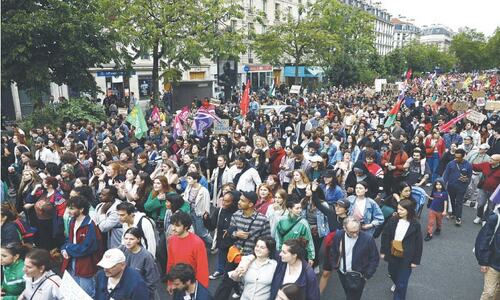MOSCOW: By the end of the first week of Pussy Riot's trial, everyone in the shabby Moscow courthouse was tired. Guards, armed with submachine guns, grabbed journalists and threw them out of the room at will. The judge, perched in front of a shabby Russian flag, refused to look at the defence. And the police dog — a black Rottweiler — no longer sat in the corner she had occupied since the start of Russia's trial of the year, but barked and foamed at the mouth as if she were in search of blood.
The trial of the three band members, jailed since March after performing a “punk prayer” against Vladimir Putin in Moscow's main cathedral, has been about more than the charges brought against them — formally, hooliganism motivated by religious hatred. In five days of testimony, lawyers and witnesses have laid bare the stark divide that has emerged in Russian society: one deeply conservative and accepting of a state that uses vague laws and bureaucracy to control its citizens, the other liberal bordering on anarchist and beginning to fight against that state with any means it can.
The court is dominated by a glass cage that holds the three women — Maria Alyokhina, who has emerged as their unofficial spokeswoman; Nadezhda Tolokonnikova, whose chiselled features have made her the band's unofficial face; and Yekaterina Samutsevich, who sits in a corner of the cage looking every bit the disgruntled punk.
After five days’ sitting in the cage, some days for 10 hours at a time, the women appear exhausted. Violetta Volkova, one of their lawyers, said they were being tortured — denied food and adequate sleep. After a week of being dismissed and lectured by the judge, she could no longer hide her anger. On Friday, as the judge, Marina Syrova, denied yet another defence objection, Volkova began to shout.
Syrova, her glasses forever perched perfectly in the middle of her nose, answered tartly: “You're losing the frames of dignity.”
“Those frames long haven't existed here,” Volkova replied, seething.
According to Pussy Riot's lawyers, Russia has revived the Soviet-era tradition of the show trial. “Even in Soviet times, in Stalin's times, the courts were more honest than this one,” lawyer Nikolai Polozov shouted in court. Outside, during a rare break, he explained: “This is one of the most shameful trials in modern Russia. In Soviet times, at least they followed some sort of procedure.”
In one week, Syrova has refused to hear nearly all the objections brought by the defence. One objection claimed that exactly the same spelling errors were found in several witness statements, implying they were falsified.
The prosecution was allowed to call all its witnesses, mainly people who were inside the church at the time of the performance or who had viewed a video of it on YouTube. They answered questions like: “What does your Orthodox faith mean to you?”,
“Was the women's clothing tight?” and “What offended you about their balaclavas?”
By arrangement with the Guardian











































Dear visitor, the comments section is undergoing an overhaul and will return soon.